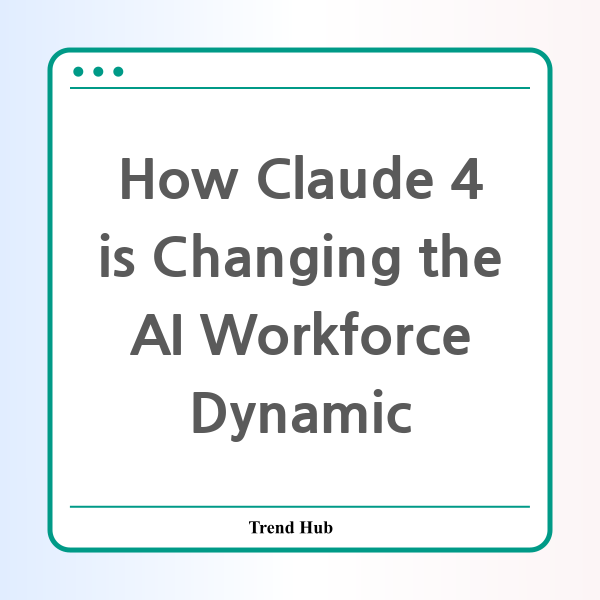* This website participates in the Amazon Affiliate Program and earns from qualifying purchases.

As the world becomes increasingly reliant on artificial intelligence, Anthropic has just introduced its latest AI models, known as Claude 4, which promise to redefine how we think about AI's role in the workplace. Is the future of AI in the workforce about to change dramatically? Let’s delve into the exciting developments surrounding Claude 4 and what it means for businesses and employees alike.
On Thursday, Anthropic unveiled its new AI model, Claude 4, which is designed to operate almost an entire workday—nearly seven hours—without needing constant human intervention. This marks a significant leap towards AI's potential to handle more complex tasks and offers a glimpse into a future where AI can manage full shifts traditionally occupied by humans.
The introduction of Claude 4 is particularly important in an era where tech giants are in fierce competition to develop advanced AI systems. Anthropic's Claude 4 comes in two variants: Claude 4 Opus, a model that tackles complex challenges efficiently, and Claude Sonnet 4, which is designed for everyday tasks and improved coding capabilities.
What sets Claude 4 apart is its ability to analyze vast amounts of information, similar to a human employee. For instance, a marketer can leverage Claude Opus 4 to evaluate performance data from multiple advertising campaigns. This AI can provide insights into why specific campaigns performed differently and suggest actionable strategies to surpass past results. This highlights AI's potential to assist professionals by taking over mundane tasks, allowing them to focus on more fulfilling aspects of their jobs.
Industry Impact
As companies increasingly adopt AI technologies, a recent survey indicates that enterprise spending on generative AI skyrocketed sixfold from 2023 to 2024. This is a clear signal that businesses recognize the value of integrating AI into their operations. Yet, with this rapid advancement comes the concern that AI might displace jobs. A report by the World Economic Forum predicts that 41% of employers plan to downsize due to AI's growing influence.
Nevertheless, developers like Scott White from Anthropic emphasize that AI, particularly Claude 4, is meant to be a collaborative tool rather than a replacement. It is anticipated that AI could even empower individuals to expand their skills beyond traditional educational pathways. For instance, an engineer could use Claude to create intricate designs without prior training in graphic design, thereby fostering innovation in various sectors.
Advancements and Features
Anthropic has made significant advancements in Claude 4's reasoning abilities by adopting new mechanics that allow users to see summaries of the model's thought processes. This not only enhances user experience but also incorporates additional safety measures, as the model's capabilities necessitate higher levels of control to prevent misuse.
As Claude 4 enters the marketplace, it faces tough competition from other tech giants like Google and OpenAI. However, with the introduction of its capabilities, Anthropic aims to establish itself as a frontrunner in AI technology. By enabling AI agents powered by Claude 4 to analyze thousands of data sources, execute long-running tasks, and produce human-quality content, Anthropic is gearing up to redefine productivity in workplaces across the globe.
Conclusion
The unveiling of Claude 4 underscores a transformative shift in how businesses could leverage AI technology. While concerns about job displacement are valid, Claude 4 offers an opportunity for workers to delegate tedious tasks and enhance their productivity. As AI becomes more integrated into daily business operations, the collaboration between humans and machines may evolve into a more symbiotic relationship where both thrive. The future of work with AI now seems not just possible, but inevitable.
* This website participates in the Amazon Affiliate Program and earns from qualifying purchases.